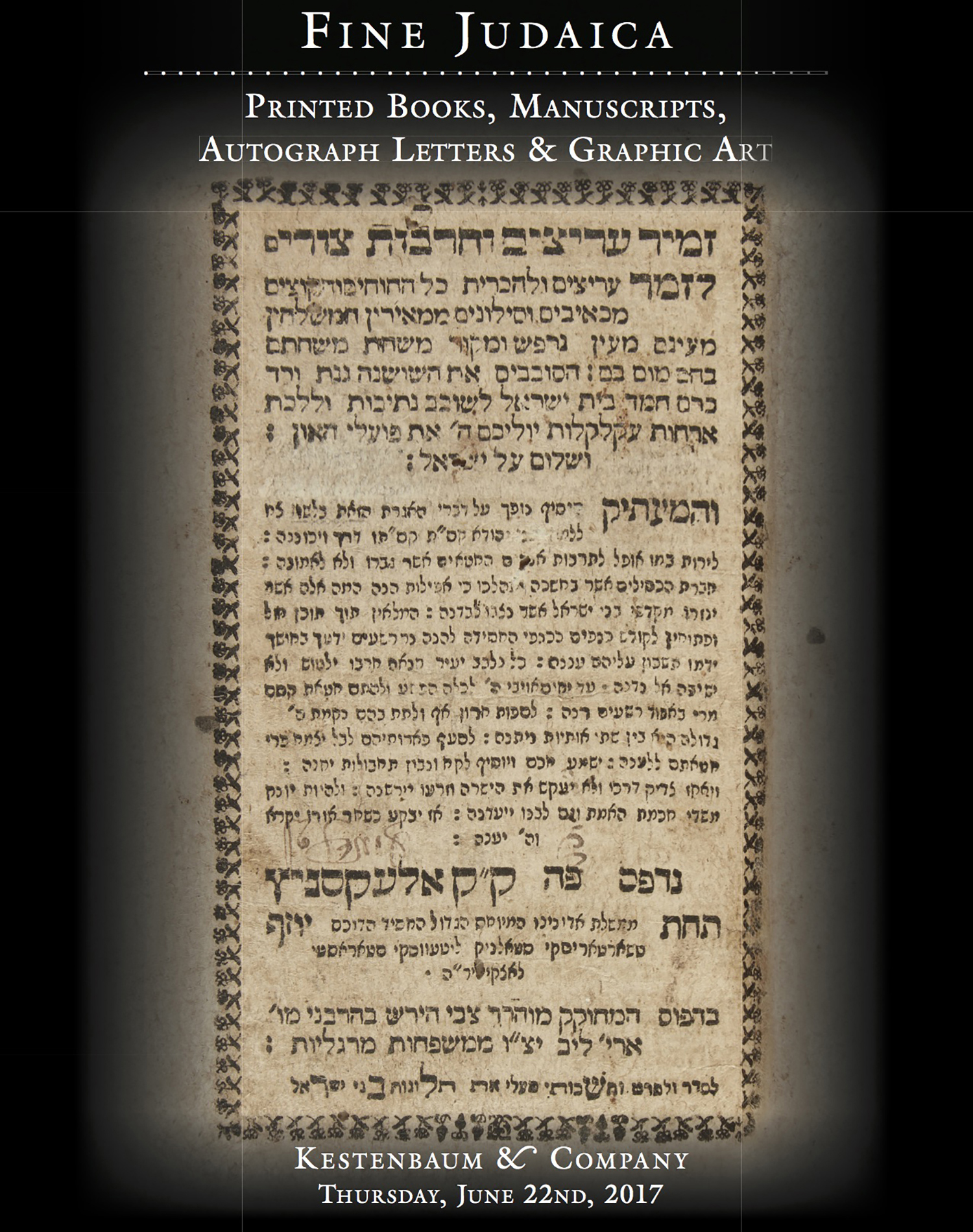<<(Shadal).>> Commentary to the Book of Yechezkel (Ezekiel). Chaps. 1-33.

AUCTION 73 |
Thursday, June 22nd,
2017 at 1:00
Fine Judaica: Printed Books, Manuscripts, Autograph Letters & Graphic Art
Lot 300
LUZZATTO, SAMUEL DAVID
<<(Shadal).>> Commentary to the Book of Yechezkel (Ezekiel). Chaps. 1-33.
(Padua): n.d
Est: $10,000 - $15,000
PRICE REALIZED $13,000
Samuel David Luzzatto (1800-1865) was a leading Jewish intellectual light of the 19th century. He was a philologist, grammarian, poet, literary historian and Bible commentator, who said of himself "Judaeus sum, judaici nihil a me alienium puto / I am a Jew; Nothing Jewish is alien to me". [Iggerot Shadal v. II, pg. 780] Luzzatto served as a bridge between the Italian Jewish scholarly tradition of polymath rabbis such as Azariah de Rossi, Elijah Levita, and Leon da Modena, engaging in critical historical and philological studies, availing themselves of classical and Christian sources as well as the full broadness of the rabbinic literature, and the nascent Jewish Wissenschaft movement of his time, which was the precusor to modern academic Jewish studies. Although Shadal’s writings are filled with daring, they are also permeated with faith in God and reverence for the Torah and traditional rabbinic texts.
Shadal was a bonafide celebrity of Jewish learning in his time. He trained two generations of Italy's rabbis in his position as Professor at the Rabbinical Seminary of Padua, and corresponded on all manner of learned topics with scholars both Jewish and Christian, in Eastern and Western Europe, in Palestine and North Africa, in at least four languages.
Shadal wrote broadly in numerous scholarly fields, but his greatest passion was Bible translation and commentary (Iggerot Shadal v. II, pg. 1414). It may be said of Shadal that he wrote the first modern Jewish Bible commentaries. Shadal would teach various books of the Bible to his students, and to that end he prepared translations and commented on the text. Each time he taught the book again he would revise his text according to his new insights, sometimes including comments of his students or son Ohev Ger (Filosseno Luzzatto, 1829-1854) whom he viewed as his scholarly scion. Some of this work was brought to the press by Shadal himself while others were worked and reworked upon by him and published posthumously or not at all.
The present manuscript is an original autograph of Shadal's Italian translation and Hebrew commentary to the first half of Ezekiel, composed in his exceedingly neat and beautiful Italian and Hebrew handwriting. It seems to be his third and apparently final revision, completely corrected and superior to the manuscript used for the printing in Lemberg 1876 ("Pirush Shadal al… Jeremiah, Ezekiel, Proverbs and Job"), which was based on his second revision. That printed edition contained material crossed out by Shadal here in this manuscript, is missing sentences he added later, and also omitted his Italian translation.
Shadal appears to have partly intended to use this commentary to call attention to his precocious son Ohev Ger as a promising scholar, citing an explanation by him in the very first verse, and throughout. In addition, from chapters 27:17 to 29:14 the commentary is completely authored by Ohev Ger, as Shadal notes in the text. It translates and comments upon the first half of Ezekiel alone because all of the haftarot from Ezekiel are from this half of the book, and Shadal prioritized this part of the text so that his work could be used for Bibles in the synagogue.
In this manuscript Shadal makes copious use of the classical Jewish commentaries, Christian scholars, classical texts, and modern European lexical and reference works, as well as his own original suggestions based upon realia, philology and occasionally positing a textual emendation - a first for a Jewish commentator. It is possible that he did not bring this manuscript to press himself because he considered certain emendations provided too controversial.
(Details in this regard, as well as a more comprehensive description available upon request).
With grateful thanks to Shimon Steinmetz, Brooklyn, NY for his scholarly expertise in preparing the description of this manuscript.
